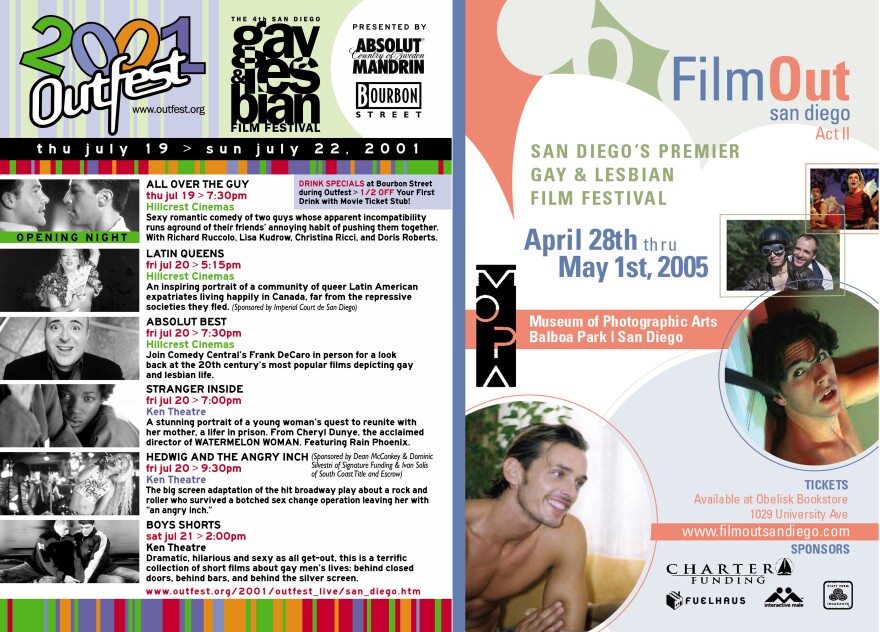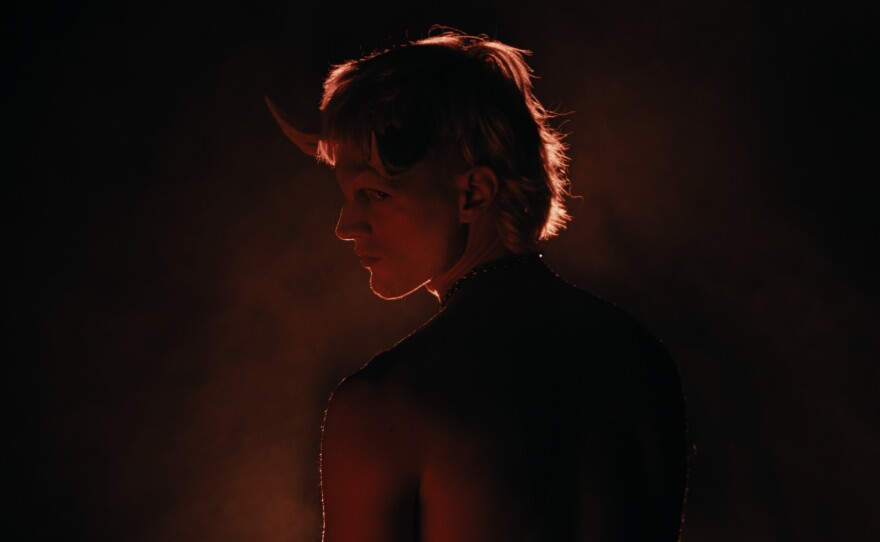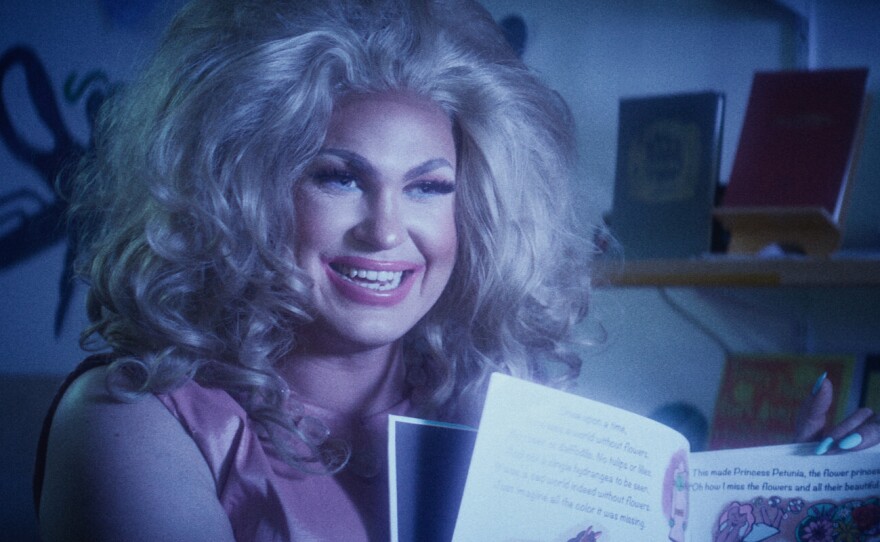FilmOut, San Diego’s LGBTQ+ film festival, turns 25 this year. So the time seemed right to remind people how it all started.
Origin story: From thesis to festival
FilmOut has its roots at San Diego State University and a student named Joe Ferrelli.
“So the festival started when I was at San Diego State doing my master's,” Ferrelli explained. “I decided to do this festival as a thesis project. There was no queer film festival in San Diego at the time. I found out that the last time that there was something was in 1984, and it was put on by the Men's Center and it was at the Ken. My thesis was about identifying a queer sensibility in otherwise unqueer films, if you will. Things like Terence Davies, the first time I saw his ‘Distant Voices, Still Lives,’ I knew that he was a gay filmmaker, even though there was nothing about the film that was gay. So I decided to explore this a little bit and went back through a history of queer films. And as I was doing this, I decided that it would be a good time to start a film festival.”
FilmOut’s long, winding road began in 1993 when Ferrelli filed for nonprofit status. He later launched the festival at the Ken Cinema. After Ferrelli left San Diego, FilmOut went through a messy period that included time off, a rebranding through Outfest Los Angeles (which tried its hand at doing Outfest San Diego), and serving as a sidebar at the San Diego Film Festival before reclaiming its FilmOut name in 2005 and becoming an annual festival, with Michael McQuiggan taking over over as program director.
“The first few years were rocky,” Ferrelli admitted. “It was hit and miss. Crowds were very small, and the films to pick from were very few compared to what Michael gets now. But I just hoped that it would become something that could feature LGBTQ+ representation in films. I didn't want to focus on only those kinds of films. So I looked at the works of directors that I knew were gay but that didn't make outwardly gay films, people like Terence Davies. And that got me thinking that there was this underlying queer sensibility, especially in the time when you had the Hays Code, where you couldn't talk about homosexuality. So filmmakers would have to work to get their ideas across to like-minded people. The first year of the festival, I also showed some gay silent films.”
One of the things I love about the festival is that foundation Ferrelli laid, embracing a queer sensibility that went beyond the LGBTQ+ films focused primarily on identity and activism. That meant audiences could find a diverse array of genre films, which were rare in the early years of the festival.
Celebrating 25 years of FilmOut
McQuiggan confessed to being exhausted on the eve of the festival as he dealt with projection issues involving digital DCP formats.
“I can't believe the last 21 years since I've been involved with FilmOut, and here we are at this milestone event,” McQuiggan said. “I think we're selling tickets better than we ever have. I don't know if the 25th anniversary has anything to do with it, but we’ve already made more in ticket sales than we did all of last year.”

Before working with FilmOut, McQuiggan had volunteered for OutFest up in Los Angeles. Then he worked with OutFest as it briefly tried its hand at running an LGBTQ+ festival in San Diego. That’s where he met Ferrelli. Then McQuiggan, Ferrelli and Krista Page relaunched the festival in 2004 as FilmOut.
McQuiggan, who has a passion for genre films, noted: “Joe has probably more taste than I do as far as quality cinema. But that was how it all began.”
But McQuiggan keeps Ferrelli’s love for films with a queer sensibility alive in the festival programming, especially in the monthly screenings, where he can indulge in his passion for genre cinema.
This year's film lineup
The festival opens tonight with a Brazilian rom-com musical called “The Best Friend.” But the lighthearted tone of the film contrasts with the reality of running a film festival in today’s tense political climate.
“We had every intention of bringing the director and the two lead actors in from Brazil,” McQuiggan said. “But with the current political situation between the United States and Brazil, there's a concern with them as far as maybe being denied entry. For them to fly 21 hours here and maybe not be allowed to come into the country or be detained or whatever, it was a little bit tricky. So we decided not to. But the opening night short film called ‘Mean Goals,’ the entire cast is coming for that.”
The festival also boasts the world premiere of “Exit Interviews,” about a man (played by Tuc Watkins of “Desperate Housewives”) who decides to make a documentary about all his exes and why they left him.
“It's a world premiere, and they're all coming, so we're excited,” McQuiggan said. “Then ‘Plainclothes’ is the Russell Tovey film (best known as the werewolf George Sand in the BBC’s “Being Human”) that is the hot ticket on the festival circuit. That's on Saturday. And closing night I was really surprised that I was able to get the film ‘Twinless’, a big hit at Sundance. I think that's the film that's probably going to take a lot of awards home.”
Spotlight on short films
In addition to feature films, FilmOut showcases a number of short films. There is a late-morning block of shorts on Saturday and then a short paired with each feature. Filmmakers often use short films as calling cards or proof of concept that they hope will lead to a feature film or other employment. But there is also a particular craft and art to the short-film format.

L.A. filmmaker Aaron Lovett describes his short “DemonBoy” as “a film about isolation at its core. It's an erotic thriller. It's a supernatural thriller. But I made it thinking about the experience of desiring intimacy and connection in the digital age and how difficult that is, especially as a queer person living in Los Angeles. So it touches on some deep themes, but in the package of a pretty short thriller. At its core, my film is a horror movie because horror movies are often a way to find catharsis out of something about the human experience that's distressing.”
There’s also a horror element to Jonathan Hammond’s very funny “Fireflies in the Dusk,” which he calls “a time travel, Victorian, romance, parody, slasher film.”
“I have a deep love of the movie ‘A Room with a View,’ and I was also raised by a mother who worships the movie ‘Somewhere in Time,’ which I never really warmed up to,” Hammond explained. “My nature is someone who likes to make fun of things that I love and don't love. And I just have this need to make something that is different and to give people a story that becomes unexpected.”
And “Fireflies in the Dusk” does take some unexpected turns and boasts an appearance by Drew Droege. There are also surprises to be found in Aaron Immediato’s "The Last Story on Earth.”
“I've been wanting to do a sci-fi alien invasion short film for a while now with a queer twist. So ’The Last Story on Earth’ is very much what I've been calling my sci-fi love letter to drag queens, and drag artists,” Immediato said. “It is very much a creative response to the attacks that drag story hours and drag storytimes have gotten from folks around the country and around the world. I've felt that these attacks — especially targeting drag artists, focusing on them somehow not being safe for kids — has been especially offensive to me as a queer person who wishes when I was a kid, I would have been able to attend a drag story hour.”
Beth's Recommended Viewing
"Pooja Sir" (Friday, 1 p.m.)
"State of Firsts" (Friday, 3 p.m.)
"Heart of the Man" (Friday, 9:30 p.m.) paired with "Strangers on a Beach"
LGBTQ+ Shorts (Saturday, 11 a.m.)
"Plainclothes" (Saturday, 7:30 p.m.)
"Who Wants to Marry an Astronaut?" (Saturday, 9:30 p.m.)
"Sauna" (Sunday, 1:30 p.m.) paired with "DemonBoy"
"Four Mothers" (Sunday, 3:30 p.m.) paired with "Fireflies in the Dusk"
"#300 Letters" (Sunday, 5:30 p.m.)
"Twinless" (Sunday, 7:30 p.m.)
Immediato noted that filmmakers often work in silos, especially during editing. So it is great to be able to show a film at a festival and sit with an audience to see how a film actually plays. Hammond, who recently won the Comic-Con International Independent Film Festival Award for Best Humor/Comedy Film, loves watching his films with an audience.
“Watching my movies — and particularly this movie, which has a twist — and you can hear an audible gasp, it makes me giddy,” Hammond said. “But watching people, hearing people laugh, and then just that gasp, you know you have your hooks into them. As a filmmaker, it's like a cookie. It's delicious.”
Hammond has roots in San Diego and has been attending the festival for two decades, with “Fireflies in the Dusk” being his fourth film screened there.
“FilmOut means a huge, tremendous amount to me,” Hammond noted. “Michael McQuiggan has been so supportive of me as well as San Diego filmmakers. The second film I played, the viewing was like a filmmaker's dream. People were laughing when they were supposed to laugh and they were scared when they were supposed to be scared. The people sitting next to me said, ‘That was so good.’ And the lineup was incredible. So to have your film in those kinds of (screenings), but also have that reaction, in a way, it's tattooed on my brain, and I've been chasing that dragon ever since. And it's really one of the things that gave me a confidence to continue following my dream of becoming a filmmaker. And again, I just can't overstate how meaningful, impactful Michael McQuiggan's support of me and of the local filmmakers has been.”

Panel: Queer joy on screen
Saturday at 4 p.m., FilmOut will host a panel called Queer Joy on Screen, led by actor-writer-producer Ben Bauer.
For Hammond, “Queer joy is absolutely an act of rebellion because, to be blunt, the current administration is doing everything they can to subvert and take away the joy. They're trying to literally make illegal who you are. So I think by being joyful and being proud of who you are is counter to everything they stand for.”
Lovett added, “I think joy is a tough word because sometimes it can be hard to be joyful, depending on what's going on. I think if you're a person who's aware and seeing things and thinking critically, I think it can be really hard to be joyful. But I think there's something to say for having space for all the different ranges of human emotion, all of which are very valid at a time like this. And I think to ignore or relegate joy to the sidelines and say, well, we don't have time or space for that right now, I think is a mistake. I think it's a huge tragedy. And I think it's so important to find joy, which sounds like a cliché, but I think is actually true. And I think that makes it so much more powerful in a dark moment.”
Immediato said, “Queer folks have always been under attacks, and we always will be. Elections come and go, leaders, politicians come and go, this fight will never end. There will always be fights and struggles for equality in this country and around the world. We need to see joy and we need to see pain and sorrow.”
But McQuiggan noted that he likes to try to steer the festival clear of overt political messaging.
“It is challenging,” McQuiggan said. “I just want people to come to be entertained. And I'm gearing away from a lot of the films that were really in your face, aggressive to deal with the current political climate. But I want people just to come in to get away from that for at least four days and just come and enjoy cinema. That's what my goal is.
"And it's interesting. I'm not sure what the future for FilmOut is going to hold after this year. I did some research the other day, and there are only 171 LGBTQ film festivals left. I think when we started this, there were like 700. It's changing. I don't know how we're going to evolve. We need to completely reassess the entire organization to see what we can do to stay relevant. That's what's going to happen after this festival. We'll see.”
Still, just having the festival can feel political.
“Having a festival like this in this particular time, just showing up, I believe, is a political act,” Hammond said. “I think just being yourself and supporting your community is beyond important. I think just being who you are and being a part of your community and letting yourself be seen and your voice heard, it’s subversive right now given the nature of the administration. So I encourage everyone to show up and support.”
Lovett agreed, “I think right now it's incredibly important to appreciate whatever opportunities we have to share queer work, to be in community with queer people, to engage in the culture in a way that acknowledges the current political climate, while also just making space to exist — I don't think there's any other option. And I think at this point, queer people have to continue to do what they've been doing, even if right now it feels like it might not be working. I think it's also important to not let that completely disrupt or stop queer existence and queer life and what it means to be queer and to make queer art and to share it with people, not only other queer people, but straight people and cis people as well. I think that's more important probably now maybe than it's ever been in recent history.”
For 25 years, FilmOut has played a role not just in the LGBTQ+ community but also in the broader film community.
It makes Ferrelli proud.
“Seeing what Michael has done with it — Michael and company — it's just been wonderful. It's just been an amazing thing. I could never imagine it would have gone this long or been this successful,” Ferrelli said.
FilmOut kicks off Thuresday at The Nat with “The Best Friend” and then moves to the Museum of Photographic Arts for Friday through Sunday. Check out the full lineup.





